Atten-tion! Life in BU’s ROTC

ROTC Army Cadets and friends Dharma Cooper (Pardee’25) (left) and Audrey Soukup (CGS’23, Sargent’25) exchanging snacks during a break in their semiannual field trip to Joint Base Cape Cod for weapons practice on the base gun range.
Atten-tion! Life in BU’s ROTC
Juniors Dharma Cooper and Audrey Soukup offer a glimpse into what it takes to be an Army ROTC cadet
Atten-tion!
It’s 6 am on a recent morning on Boston University’s West Campus and Army Cadets Cooper and Soukup have already been awake for two hours.
The friends and classmates are currently in the middle of Leadership Lab, a biweekly Wednesday morning class for students enrolled in Army ROTC, or the Army branch of the Reserve Officers’ Training Corps. BU’s 47 Army cadets are joined by cadets from nearby schools, like Brandeis University and UMass Boston, who come here to use BU’s ROTC facilities.
During Lab, groups of upperclassmen cadets take turns instructing their peers on different topics related to army skills. This week’s topic? Marksmanship and weapons handling (including safety), to prepare for an upcoming trip to the gun range at Joint Base Cape Cod (JBBC).
“If I’m an inch off on the 50-meter target, I’m going to be way off on the 30-meter target,” a student instructs fellow cadets at his Lab station, holding a bright blue plastic replica of an M4A1 Carbine, the Army’s standard-issue rifle. “That’s why it’s important to zero out well.”
At a later station, cadets take turns firing at targets on ROTC’s smokeless range, a video simulator that’s reminiscent of the arcade game Big Buck Hunter—if Big Buck Hunter were used to train future Army service members. Each student practices firing from the required positions: prone supported, prone unsupported, kneeling supported, kneeling unsupported, standing supported, standing unsupported.
It may seem like a lot for an early Wednesday morning, but the practice is important. This summer, the juniors—or 3s, as they’re called in ROTC parlance—all have to qualify on the range at Cadet Summer Training. Their scores at camp contribute to their rankings in the OML, or the Order of Merit List, a nationwide ranking of ROTC cadets based on factors like GPA, volunteer hours, leadership skills, and physical fitness scores. Their rankings help determine their future assignments within the Army.
For Cadets Cooper and Soukup, also known as Dharma Cooper (Pardee’25) and Audrey Soukup (CGS’23, Sargent’25) in the civilian world, the pressure is on.
At the end of Lab, Soukup, one of the day’s Lab leaders, calls everyone in for final announcements.
“Fall in!” she yells.
Once everyone is in formation, she delivers a light admonishment to those who didn’t come prepared that morning. “If we say bring a pen, guys, that means bring a pen,” she says pointedly. (Yes, there was a pop quiz, and yes, several cadets had to borrow writing instruments.) Also on the agenda: tomorrow morning’s physical training, a six-mile ruck, for which they will be weighing everyone’s rucksacks. (The designated weight: 35 lbs.) And some good news: at Ranger Challenge, a Tough Mudder–esque extracurricular competition between a region’s ROTC programs, BU scored 17th out of 48 teams. Cheers go up, and that signals the end of announcements.
“Fall out!” Soukup yells.
“Don’t call it ‘Rot-sea’”
There are a lot of things people don’t understand about ROTC.
Number one? “Don’t call it ‘Rot-sea,’” says Brittany Torro (CAS’25), a fellow 3 and close friend of Soukup’s and Cooper’s. They quickly agree with her—that’s annoying.
It’s now Wednesday afternoon and the friends are congregating with their fellow 3s for their Military Science (MS) class in the ROTC building at 300W Babcock St. Underclassmen—1s and 2s—have MS once a week. For upperclassmen, MS is twice a week. The course covers practical military skills, which can range from field hygiene to leading ambushes.

Platoon Sergeant Soukup overseeing her platoon as they prepare to depart from BU’s West Campus on an early October Sunday morning.
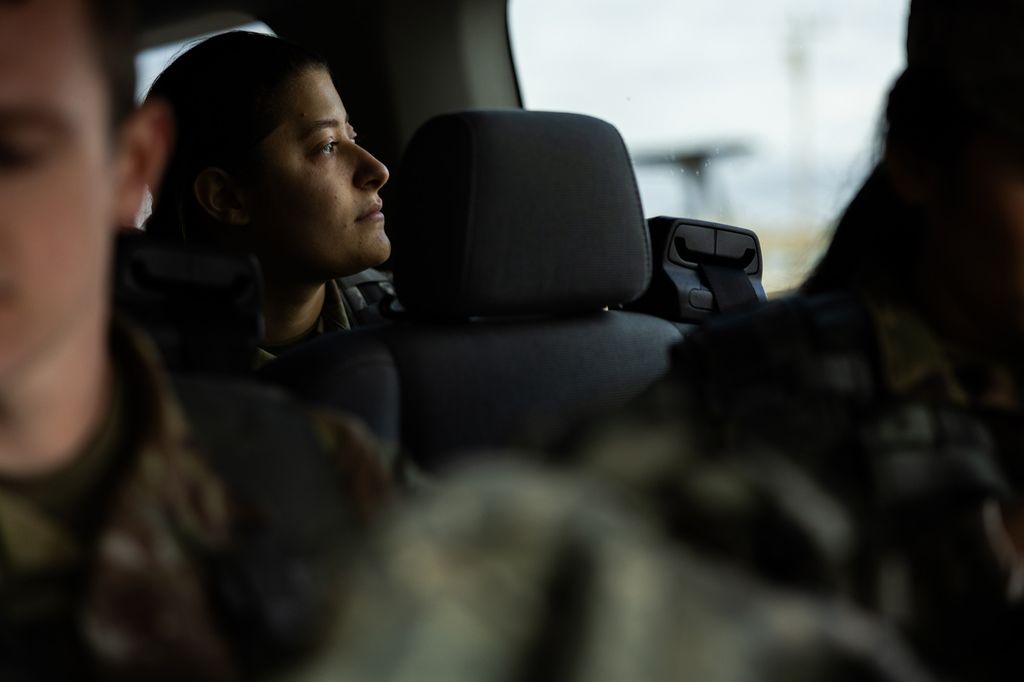
This JBCC field trip will mark both Cooper’s and Soukup’s first time shooting on JBCC’s qualification gun range.
Platoon Sergeant Soukup overseeing her platoon as they prepare to depart from BU’s West Campus on an early October Sunday morning (left). This JBCC field trip will mark both Cooper’s and Soukup’s first time shooting on JBCC’s qualification gun range (right).
Cadets also have physical training three times a week, typically starting at 5:45 am on Nickerson Field. They’re expected to stay in shape through independent workouts as well. That’s one area where having ROTC friends comes in handy—it’s a lot easier to head to FitRec for a lift or cardio session when you have built-in gym buddies.
Today, the three are waiting for their turn to practice on the smokeless range, which can accommodate two people at a time. Usually, class is a little more classroom-like, they say. But with the upcoming range trip that weekend, their instructors—who include Captain Brandy Hernandez and Sergeant Major Matthew Zepeda—are trying to circle everyone through the practice range.
That also means the vibe is more casual than usual. Cadets watch each other shoot on the big screen as Zepeda supervises. Some bust out a couple of pull-ups on hanging bars to kill time. Others grab their laptops to sign into virtual information sessions for summer ROTC internships. In the back of the room, Torro, Cooper, and Soukup have time to talk about their experiences in the program.
Another ROTC misconception? “That people think we’re all weird war kids,” says Soukup, who is captain of the BU Equestrian Team.
That definitely comes from the perception that ROTC is all conservative, white, and male, she and Cooper say. But of course, they, Torro, and the 10 other female Army cadets would heartily disagree. (As would Hernandez, a former Blackhawk pilot.)
And not everyone in the program will actually end up in combat. Students can choose to enroll in Army, Navy, or Air Force ROTC, all four-year programs. For students who choose Army ROTC, those who receive ROTC scholarships or make it to the ROTC Advanced Course—the set of classes for juniors and seniors—must agree to contract for a period of service with the Army.
“Enrolling in ROTC is like joining any other college program,” says Scott Braithwaite, enrollment and scholarship officer for BU Army ROTC. “No one will force you into any kind of contract; you have to meet qualifications to contract and you have to be chosen by us based on your performance.” And, he adds, cadets can drop the program if it isn’t right for them.
Or, as the ROTC website explains: You will serve four years Active Duty if selected, and four years in the Inactive Ready Reserves. Cadets may choose to serve part-time in the US Army Reserve or Army National Guard while pursuing a civilian career. Cadets who compete for Active Duty and do not receive an Active Duty assignment will be assigned to the Army Reserve or Army National Guard in the state of their choice (subject to availability). Enrolling in the Army ROTC Basic Course does NOT involve a commitment of service to the Army unless you have contracted or received an Army ROTC Scholarship.

Soukup and one of her instructors (left). Despite the early mornings and stressful training sessions, ROTC is full of jokes and camaraderie. Anyone who’s a good friend and teammate has a high chance of succeeding in the program, says recruitment officer Scott Braithwaite.
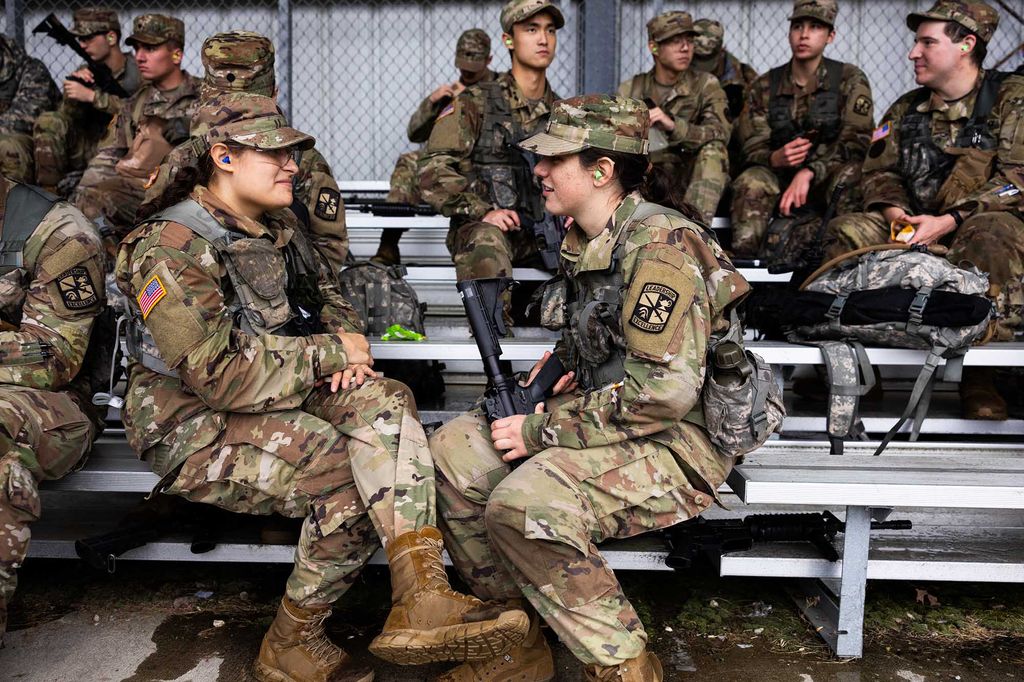
Cooper (left) and Soukup waiting with their fellow cadets for a turn at the target competency test. Today’s tests are important hands-on practice for Cadet Summer Training, where they have to pass weapons competency tests. Their test scores will contribute to their OML (Order of Merit) rankings, a nationwide ranking of ROTC cadets based on factors like GPA, leadership skills, and physical fitness.
Soukup and one of her instructors. Despite the early mornings and stressful training sessions, ROTC is full of jokes and camaraderie. Anyone who’s a good friend and teammate has a high chance of succeeding in the program, says recruitment officer Scott Braithwaite (left photo). Cooper (left) and Soukup waiting with their fellow cadets for a turn at the target competency test. Today’s tests are important hands-on practice for Cadet Summer Training, where they have to pass weapons competency tests. Their test scores will contribute to their OML (Order of Merit) rankings, a nationwide ranking of ROTC cadets based on factors like GPA, leadership skills, and physical fitness (right photo).
In senior year, cadets go through the “branching process” to determine which of the Army’s 17 branches they’ll go into. The branches: adjutant general, air defense artillery, armor, aviation, chemical corps, corps of engineers, cyber corps, field artillery, finance, infantry, medical services, Military intelligence, Military police, ordnance, quartermaster, signal corps, and transportation. (Find more information about each branch here.)
Cadets receive their matches in November of their senior year. After graduating, they are commissioned as second lieutenants in the Army and head to a leadership course. Once completed, they continue on to their assigned branch.
Soukup and Cooper are still deciding what path they’ll pursue. An international relations (IR) major and Spanish minor, Cooper is interested in the more logistical side of the Army, like Military intelligence or adjutant general. Soukup is studying behavior and health and minoring in public health and plans to pursue a master’s in public health. She’ll most likely go for medical services, she says, but isn’t 100 percent sure yet.
Unfortunately, there isn’t enough time for everyone to take a turn on the smokeless range. The next group of 3s start filing in—they were split into two groups for class today—and the current 3s get ready to depart. Eventually, the class will move on to other topics related to their training, like battle drills and troop-leading procedures.
Regardless of the fact that neither Cooper nor Soukup plan to go into infantry, everyone is trained in basic infantry skills. Some days that’s met with more enthusiasm than on others.
“My mom was in the Army, and sometimes I’ll complain to her, like, why is there so much emphasis placed on me being able to, say, rappel down the rappel tower when I don’t want to enter that branch?’” Soukup relates. “What she always says to me—every time—is that you can be a doctor, you can go into the Finance Corps, but you are a soldier first.”
Ability to overcome challenges
“Successful cadets come from any background,” Braithwaite says. “The Army provides the tools and the fantastic instructors to help students realize their potential and become officers upon graduation, but what makes a student successful is personal drive and motivation and the ability to overcome challenges.”
Cooper joined the program as a sophomore, after transferring to BU from the University of Denver. She’d long been curious about ROTC and knew her IR major would complement a future Army career. Joining as a sophomore meant she had to take MS for 1s and 2s simultaneously to catch up with her classmates. She met and became close with Soukup, who she credits with helping her through the program.
“All my friends from home were shocked that I joined ROTC, because I’m not that ‘stereotypical’ Army candidate,” Cooper recalls. But BU—as a leading research institution on the East Coast—maybe isn’t a stereotypical ROTC school to begin with.
“There’s a lot of diversity of thought that BU attracts that we’re privileged to have,” Cooper says, thoughtfully. Same goes for the Army in general, she adds. Participating in language programs with cadets from around the country this past summer really drove those points home for her. (She learned Swahili while Soukup learned Russian.) “People see the uniform and [think all cadets are the same], but we’re all individuals with different beliefs and different backgrounds,” she continues. “I’ve really begun to appreciate how privileged our program is to have the level of funding it does,” both in terms of amenities and the range of students BU can provide for.

Cadets Cooper (left) and Soukup during Spring Field Training Exercise Air Assault School

The two, with friend and ROTC classmate Brittany Torro (CAS’25) (right), at an ROTC award ceremony, where Soukup was honored.
Cadets Cooper and Soukup during Spring Field Training Exercise (left photo). The two, with friend and ROTC classmate Brittany Torro (CAS’25) (right), at an ROTC award ceremony where Soukup was honored (right photo). Photo courtesy of Cooper and Soukup
Many are drawn to ROTC in part because of the financial support the program provides. Eligible students can have their full tuition and fees paid for, and in some cases, room and board, too. Braithwaite notes that currently, 35 percent of BU’s Army cadets are receiving full merit scholarships.
That’s how Soukup, who comes from a military family, ended up in the program. When it came to paying for college, the Central Massachusetts native was on her own if she wanted to attend a non–state school. She applied for an ROTC scholarship, which works by matching each applicant with a selection of ROTC schools. The applicant still has to get into those schools, however. (Cooper also has an ROTC scholarship.)
As soon as Soukup got her acceptance letter from BU—one of her three matched schools—it was a “no brainer,” she says. “The education you get at BU is just not comparable to what I would have gotten anywhere else.”
“Our boss is the president”
It’s not always easy balancing a full academic load with ROTC obligations.
Most cadets go to regular classes in between Leadership Lab and Military Science. Today, Torro also fits in a lift session. Waiting with her friends for a turn on the range, she mentions being snapped at by a professor for being five minutes late to class that morning. “I wanted to say, my day started at 5 am—give me a break, okay?” an exasperated Torro says.
That’s another thing people tend not to understand about ROTC: not just the early mornings, but the level of commitment the program requires.
The classes aren’t optional. The workouts aren’t optional. The field trainings—which can be held on weekends—aren’t optional. Cadet Summer Training isn’t optional. For upperclassmen, they are future Armed Forces members. Each is fully aware of the responsibility inherent in putting on their uniforms and showing up every morning.
“At the end of the day, our boss is the president,” Cooper says. Every time she and her fellow cadets wake up to run laps around Nickerson Field or take a shot on the smokeless range, “we’re serving our country.”
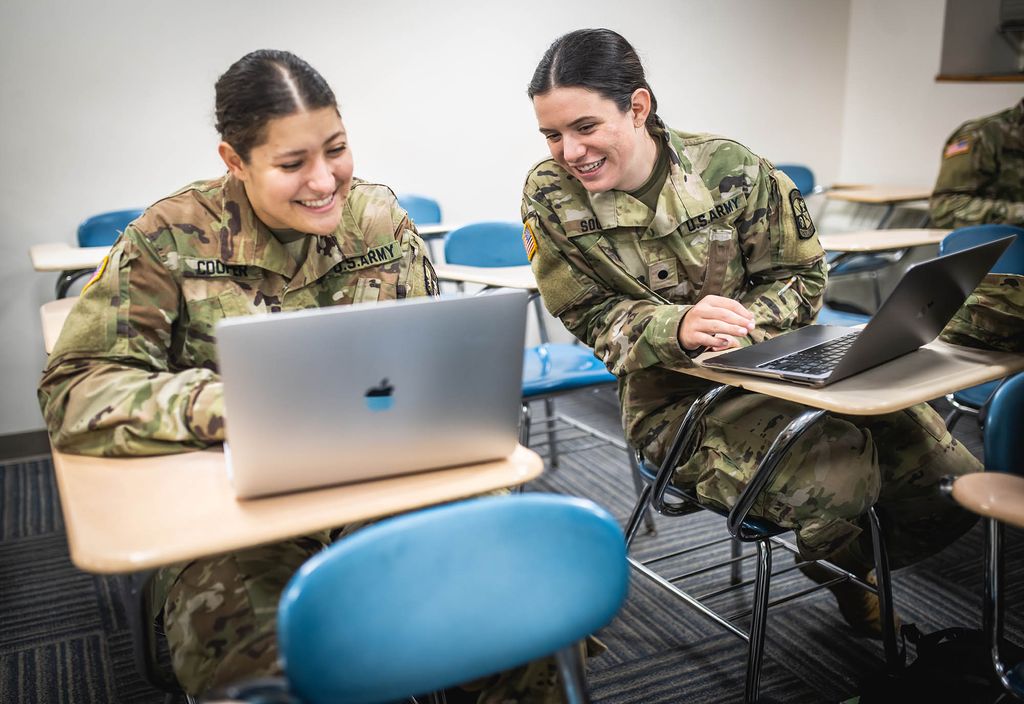
As intense as ROTC can be, neither she nor Cooper would change anything about their situations, Soukup says. “It’s given me my best friends in college.” Photo by Jackie Ricciardi
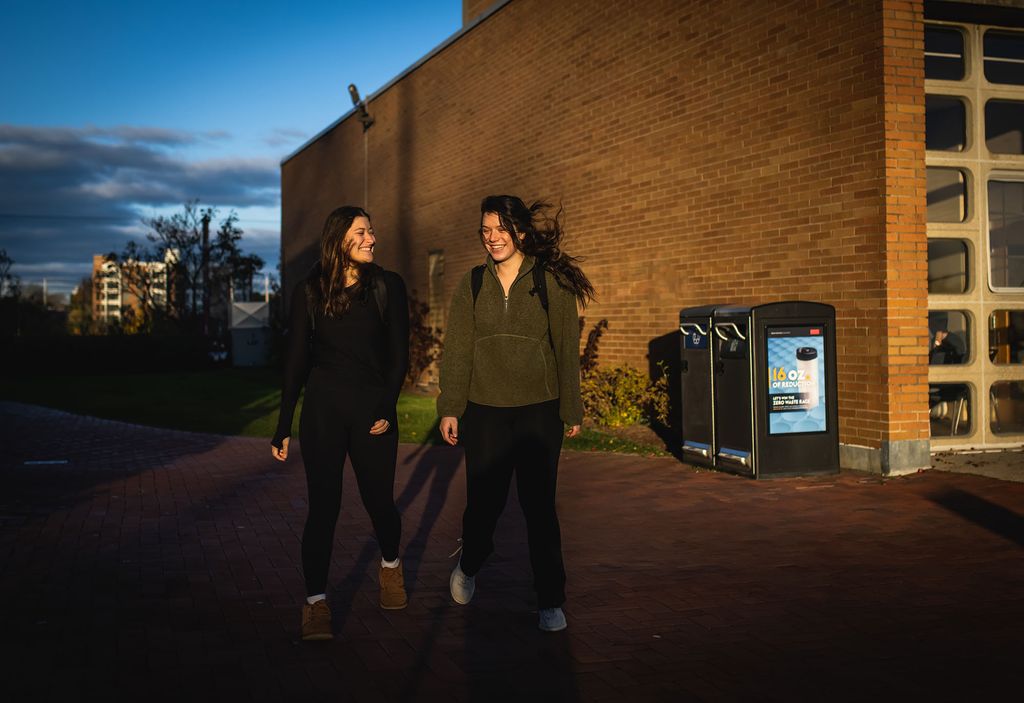
As intense as ROTC can be, neither she nor Cooper would change anything about their situations, Soukup says. “It’s given me my best friends in college.” Photos by Jackie Ricciardi
As intense as ROTC can be, neither she nor Cooper would change anything about their situations, Soukup says. “It’s given me my best friends in college.” Photos by Jackie Ricciardi
Despite the rigors and demands of cadet life, the cadets say the payoff is worth it.
“The Army is going to open doors for me that otherwise wouldn’t be possible,” Soukup says. “The things I’m going to get to do are just astronomically different from my peers.” The opportunities she’s already had are incredible, she says. But even just knowing she’ll graduate with a job and a clear career path with room for growth: “That puts me so far ahead.”
Plus: the Army is also a source of lifelong friendships and relationships.
Both Soukup and Cooper stress how critical having good friends—and especially good female friends—in the program has been to their success so far.
“Dharma and I talk about this all the time: as much as we complain about getting up early, or about how much pressure the Army puts on us, I wouldn’t change our position for the world,” Soukup says. “It’s given me my best friends in college.”
“You go through a lot together,” Cooper says. (“It’s like trauma bonding,” Soukup jokes.) Having friends to celebrate your victories, give you pep talks on your bad days, or explain the correct order of steps for engaging with the enemy—“it makes the experience so much more enjoyable, and makes you feel so much less alone amidst the stress and pressure.”
She often thinks back to her first day in MS class with the rest of the 2s.
“I was definitely nervous about making friends while starting a year behind,” Cooper recalls. “I remember walking into a classroom that was filled with boys, and then I saw these two girls sitting in the back waving at me, like, come sit with us! I was like, thank God.”
At ease, cadets.

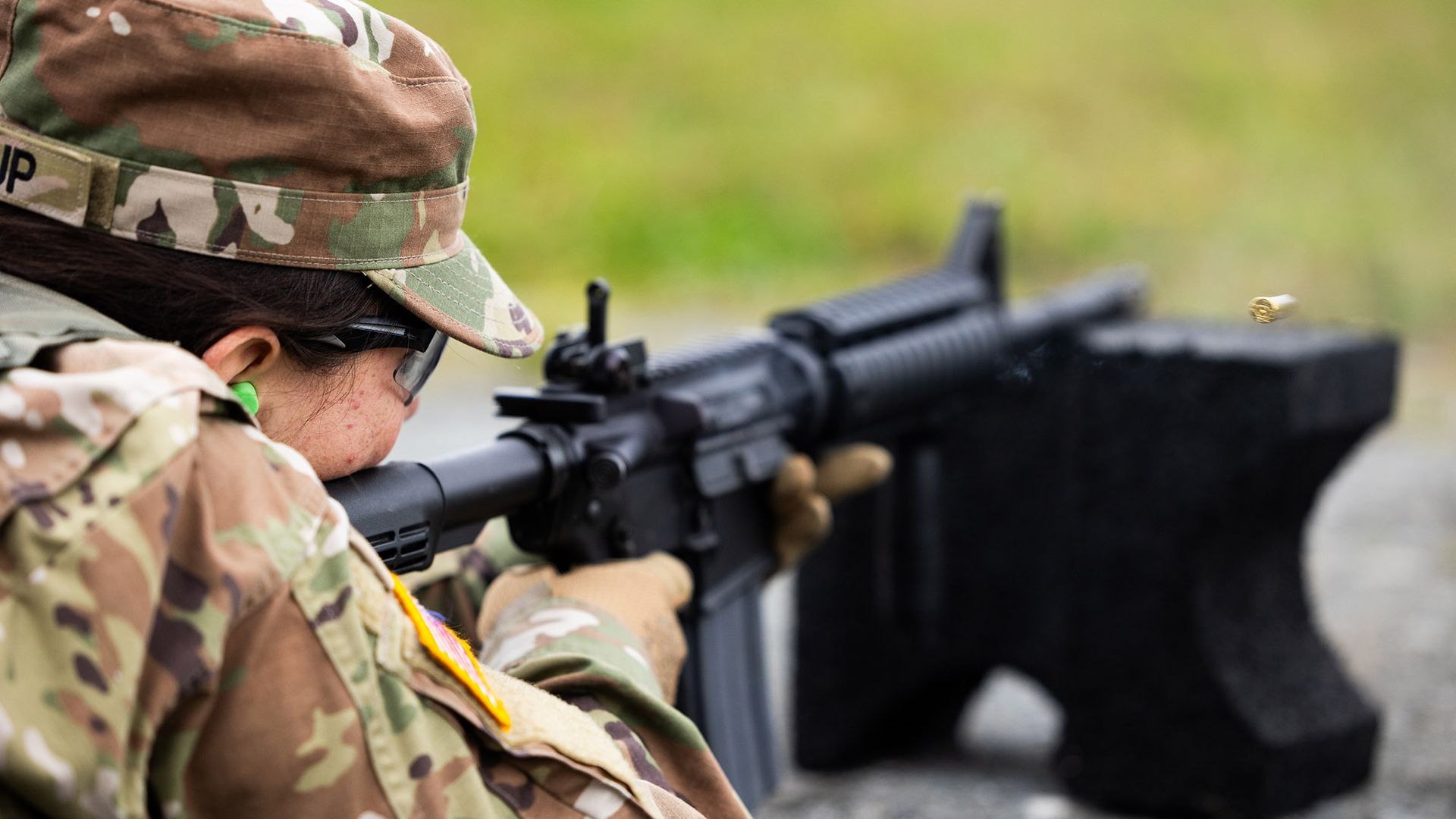


Comments & Discussion
Boston University moderates comments to facilitate an informed, substantive, civil conversation. Abusive, profane, self-promotional, misleading, incoherent or off-topic comments will be rejected. Moderators are staffed during regular business hours (EST) and can only accept comments written in English. Statistics or facts must include a citation or a link to the citation.